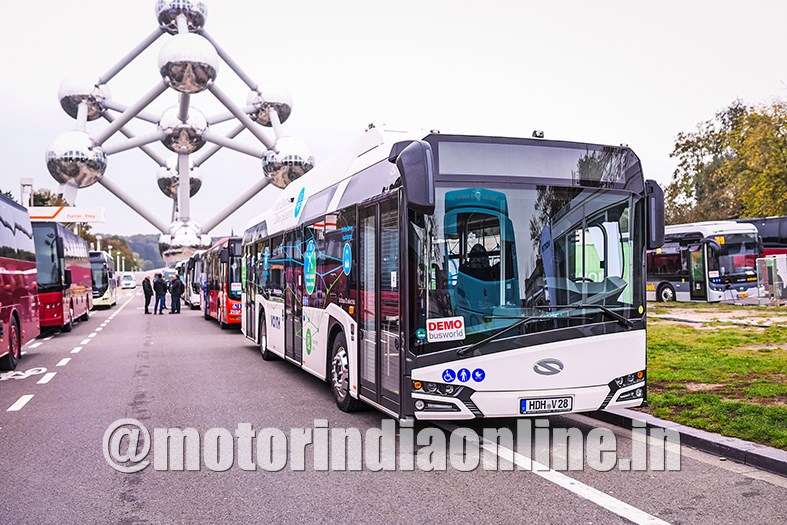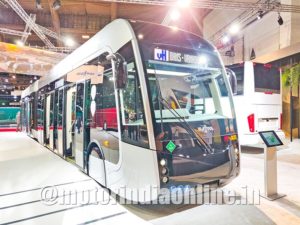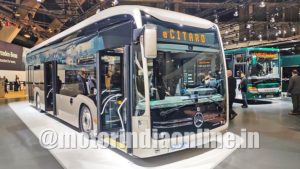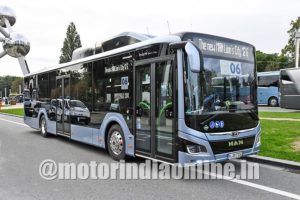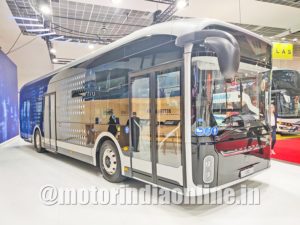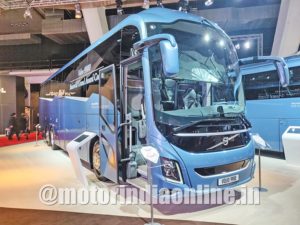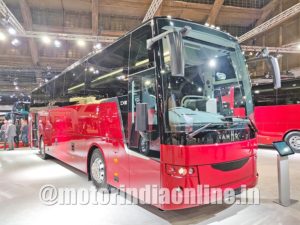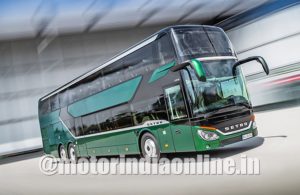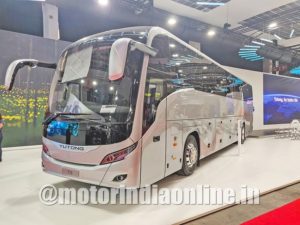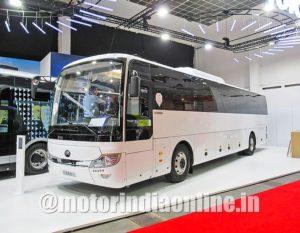The world’s largest specialist exhibition on buses, the prophecy of Busworld Europe extends far beyond prognosticating the future technological and market trends of the global bus industry, but also influencing them towards a better future. Dhiyanesh Ravichandran reports that the latest edition of the expo saw scores of bus makers and suppliers worldwide presenting their products and ideas, with clear foci on clean energy and sophisticated tech-features that mark a refreshingly ‘new’ and ‘clean’ start for the industry towards a new era.
The 25th edition of Busworld was held for the first time at Brussels, relocating from Kortrijk that had become far too cramped for the ever-increasing popularity of the expo, symbolically reflecting a refreshingly new era the global bus industry has embarked on. Not just the quest for lowering vehicle emissions and bringing new and advanced technologies on board, the new era is also defined by its sheer expansion, by fetching in myriad technology partners, suppliers, and even electric bus manufacturers who were previously aloof with the bus industry. The emergence of electronics and connected systems and electric driveline systems within the bus architecture are the primary fulcrum for all these newcomers to integrate into the industry. Not to mention the integration of global markets and fashionable product segments that are also transforming the bus industry.
This was quite evident at the 2019 Busworld Europe, the sheer number of innovative ‘clean’ vehicles – necessarily ‘emission-free’ or ‘efficiency-optimising’ solutions for buses – and advanced in-cabin electronics and safety systems that were on display was simply mind-boggling. Electrically powered buses were large in numbers, as did modular system suppliers and innovative technology solution providers fitting themselves into the e-bus ecosystem. Apart from battery-electric vehicles, fuel cell buses powered by hydrogen fuel, electric-hybrids, and trolley or tram buses were also presented for sustainable bus transportation.
On the ICE front, bus manufacturers and engine suppliers showed their readiness for the stringent Euro 6 ‘Stage D’ emission norms and alternative fuels like bio-CNG, while also demonstrating impressive levels of Nitrogen Oxides (NOx) and Particulate Matter (PM) emission reductions. Constant improvements in fuel efficiency and NVH levels of diesel engines were explicitly observed in their presentations. Although Europe and the West are greatly moving towards electric-mobility, there is still a greater room for conventional-fuel powered buses, more so in the coach segments, and so there seems no hobble in the evolution of ICE-powered buses in the wake of e-bus emergence.
Moving on, the technological divide between the Western market standards and emerging lots like that of India was starkly visible in the sophistication and equipment levels of buses on display. May it be in terms of in-cabin passenger comfort features or passive / active vehicular safety and driver assistance systems on-board, the buses are fully-loaded, as desired by operators and passengers. The European market, in particular, is known for hi-fi entertainment and infotainment features (‘Tour media guide’, as they call it) in coaches, in which the latest additions were wifi, laptop, and mobile device connectivity, along with impressive media screen and sound systems.
On the safety front, the state of affairs is way more exciting. From in-cabin assistance systems like automated fire extinguishing systems to active drive assistance including lane assist and emergency braking, we could find a plethora of value-additions to the already refined market standards. One innovative feature that caught the attention of the expo this time was the camera-based LED-screen side view mirrors, which was found to be beneficial for manoeuvring in my test drives. Further, the impressive levels of build quality, seating and driver ergonomics, and aesthetics in European buses were quite captivating. Markets like ours have a long way to catch up in all these regards.
The visitors of Busworld this time also made note of the significant progress that Chinese bus manufacturers could showcase in their products, and by extension already meeting the standards demanded by European buyers. Over and above, their buses were visually appealing and aesthetically innovative than European products, while also exhibiting their prowess in terms of technology and equipment, more so in the topflight electric bus trial that has just begun. Clearly, the future is not likely to be dominated by conventional OEMs and tech suppliers in Europe, the Chinese players are sure to get a fair share of the pie!
Lastly, a stew of products falling into a wide range of bus segments is what makes the European bus market livelier and more dynamic. This includes a novel range of ‘mini’ and ‘micro’ buses, something as what we would call as large ‘vans’ in India. Their market demand is huge across the continent, catering to a variety of applications including private tourist, staff, and sub-urban commutation. However, the equipment and passenger comfort levels are immense in these buses, we were amazed to find top-spec goodies like a 9-speed automatic / DCT gearbox, something on par with that of a premium sedan! On the whole, the international bus exhibition gave us all sorts of insights – technological and market-related – on the trajectory of the global bus industry. It made us realise that the Busworld platform is in itself a great ‘influencer’ in driving the industry towards better products and solutions towards a sustainable future.
Busworld Awards 2019: ‘Eclectic’ rather than Electric!
As in the traditions of all Busworld Europe, the latest 2019 edition also came up with Busworld Award to recognise outstanding buses and coaches under different labels. However, unlike the previous years, there were quite a number of entries competing for the awards, a majority of them being electric buses. An international jury judged all those buses to the core to identify the winners. Basically, the entries were grouped into two categories – Buses and Coaches, and exemplary products under five labels – Grand Award, Comfort, Safety, Design, and Ecology – were selected.
Buses
Grand Award & Ecology Label – Van Hool Exqui.City FC
Designed for the southern French city of Pau, this hydrogen fuel cell articulated tram bus triumphed the Grand Award and Ecology label. The jury praised its safety features, completed separated driver’s desk with centrally located controls, excellent visibility, and camera systems, along with an appreciation for its greater autonomy in comparison with electric buses.
Comfort Label – Mercedes-Benz e-Citaro
Highly ergonomic approach to driver’s desk, including space, accessibility and equipment levels, grabbed the jury’s attention.
Safety Label – MAN Lion’s City 12G Hybrid
The jury praised its extensive passive safety features for the driver, the acoustic blind spot warning, the mirrors displaying entire front of the bus, and other safety aspects for both passengers and driver.
Design Label – Yutong U12 Electric
A bit quirky it may look, its European level of design and an aesthetic balance of interior and exterior rendering is simply unmatched.
Coaches
Grand Award and Safety Label – Volvo 9900
In its latest avatar, the 9900 stands head and shoulders above the competition in terms of design, maintenance, comfort, ride quality, and acceleration, according to the jury. A wide ranging active and passive safety features, including automated fire extinguishing system, black box system on board, and energy absorption zone for driver, earned the coach the ‘Safety label’ award as well.
(Yes, we did take the ‘Grand Coach’ for a spin in the city of Brussels. Watch out for our exclusive test drive report of Volvo 9900 in our upcoming January 2020 issue!)
Comfort Label – Van Hool EX11H and Setra Topclass S 531 DT
Both the buses impressed the jury with their vehicle ergonomics, passenger comfort, and tour guide media, ex-aequo!
Design Label – Yutong T13
Yes, Yutong won another design label award, this time for its elegant design and finishing of interiors, equipment, and other components in the inter-city coach designed for Europe.
Ecology Label – Yutong ICe12 Electric coach
The only electric in this category, the 12-metre coach was appreciated for its use of recyclable materials in the cabin, with less plastics and more metals.
